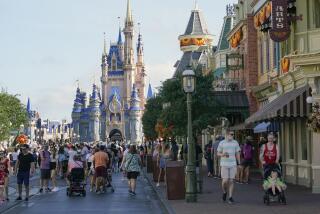Park’s Staff Dumps Trash Plan
- Share via
They drew the line at taking out the trash.
On Monday, the facilities manager at Universal Orlando’s sprawling theme park resort informed back-office workers that they would have to start disposing of their own garbage three days a week. It was one of several belt-tightening measures aimed at beefing up the resort’s “business model,” Universal Orlando chief Bob Gault said in an accompanying e-mail.
On Thursday, the unpopular trash-collection directive was rescinded, said a spokesman who declined to elaborate on the reasons.
Although employees won that battle, they’re not relieved. Sources familiar with the cost cutting underway at Vivendi Universal theme parks in Florida and California say the firm plans to eliminate an estimated 100 jobs in coming months.
Nerves already are raw at Universal’s theme park operation, which soon could be in the hands of General Electric Co., the famously cost-conscious industrial giant. GE this month reached a preliminary deal to merge its NBC broadcast and cable assets with Universal’s film studio, theme park and TV businesses. A final agreement is expected by Oct. 2, and in the meantime an army of accountants and executives from GE and NBC is poring over Universal’s books.
GE and NBC have voiced concerns about venturing into the theme park industry, about which they admittedly know little, leading many to speculate that GE will sell parks.
And that prospect has spurred senior theme park executives to try to rein in spending before the deal closes. According to company insiders, the goal is to boost the unit’s bottom line to convince skeptical GE and NBC executives that they should hold on to the operation, which has been hard hit by an industry-wide slump deepened by the lingering effects of Sept. 11 and the Iraq war. The group’s cash flow tumbled 16% last year to $70 million and is expected to show modest gains this year, according to Merrill Lynch.
Asking employees to haul out their own trash to save money is unusual but not unprecedented in corporate America. At Wal-Mart Stores Inc., where cost consciousness is almost a religion, all employees -- including the chairman and chief executive -- empty their garbage cans.
But Universal employees balked at the idea. “No one’s doing it,” said one when asked about the plan.
They worry that they can’t do anything about the impending job cuts. “We’re not so concerned about whether we’re throwing out trash; we’re more concerned about throwing the baby out with the bath water,” said one employee, noting that the parks group already has slashed about 100 jobs in the last year.
Sources say the cuts will be mostly of executive jobs in accounting, marketing and professional services. The bulk will occur at the Florida resort, which employs 12,000 people, though there will be some at smaller Universal Studios Hollywood.
GE has been coy on its plans for the unit, which includes one park in Hollywood, two in Florida and parks near Barcelona, Spain, and Osaka, Japan.
Jeffrey Immelt, GE’s chief executive, has made it clear that the company has little long-term strategic interest in the theme park business. But the firm also hasn’t indicated if, or how soon, it may try to unload the group.
NBC Chairman Bob Wright said in a recent interview that no decision had been made on the future of the theme park operation -- worth about $1.5 billion -- and that if the deal with Universal goes through, NBC may hold on to the parks until the industry picks up.
Waiting in the wings as the most likely buyer is the New York private equity firm Blackstone Group, which owns half of the Orlando resort. Blackstone was in talks with Vivendi this year about buying what it doesn’t already own of the theme park unit, and then joined Vivendi Vice Chairman Edgar Bronfman Jr. in an unsuccessful bid for the Universal assets.
However, the private equity firm is not in direct talks with Vivendi or GE and is said to be lying low until the GE-Vivendi deal wraps up.
Splitting the theme parks from the studio could create complications for a buyer. The Hollywood theme park, for example, sits on the Universal City lot, so any new owner would have to make costly lease payments to Universal.
Under former owners MCA and Seagram Co., Universal spent billions of dollars building its resort in Orlando -- which today is composed of two theme parks, three hotels and the CityWalk entertainment district -- in an effort to take on rival Walt Disney Co.
*
Times staff writer Abigail Goldman and Orlando Sentinel staff writer Todd Pack contributed to this report.
More to Read
Inside the business of entertainment
The Wide Shot brings you news, analysis and insights on everything from streaming wars to production — and what it all means for the future.
You may occasionally receive promotional content from the Los Angeles Times.











